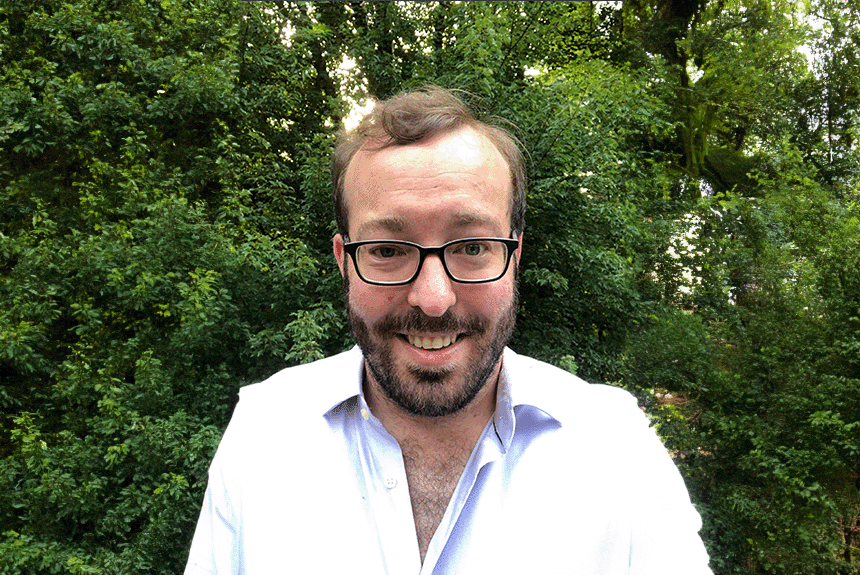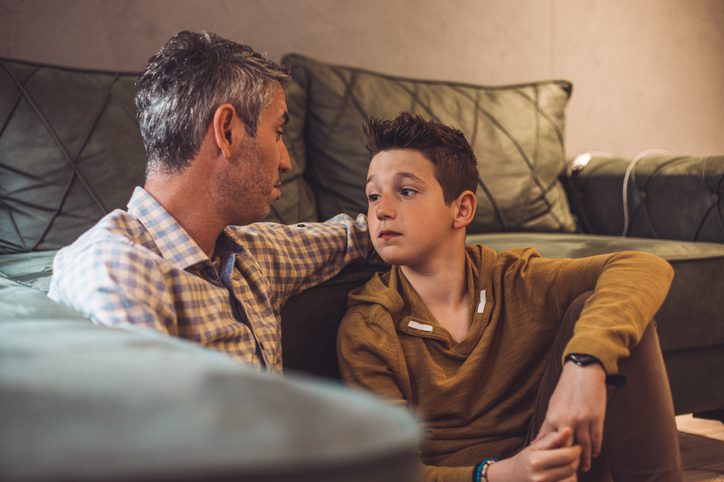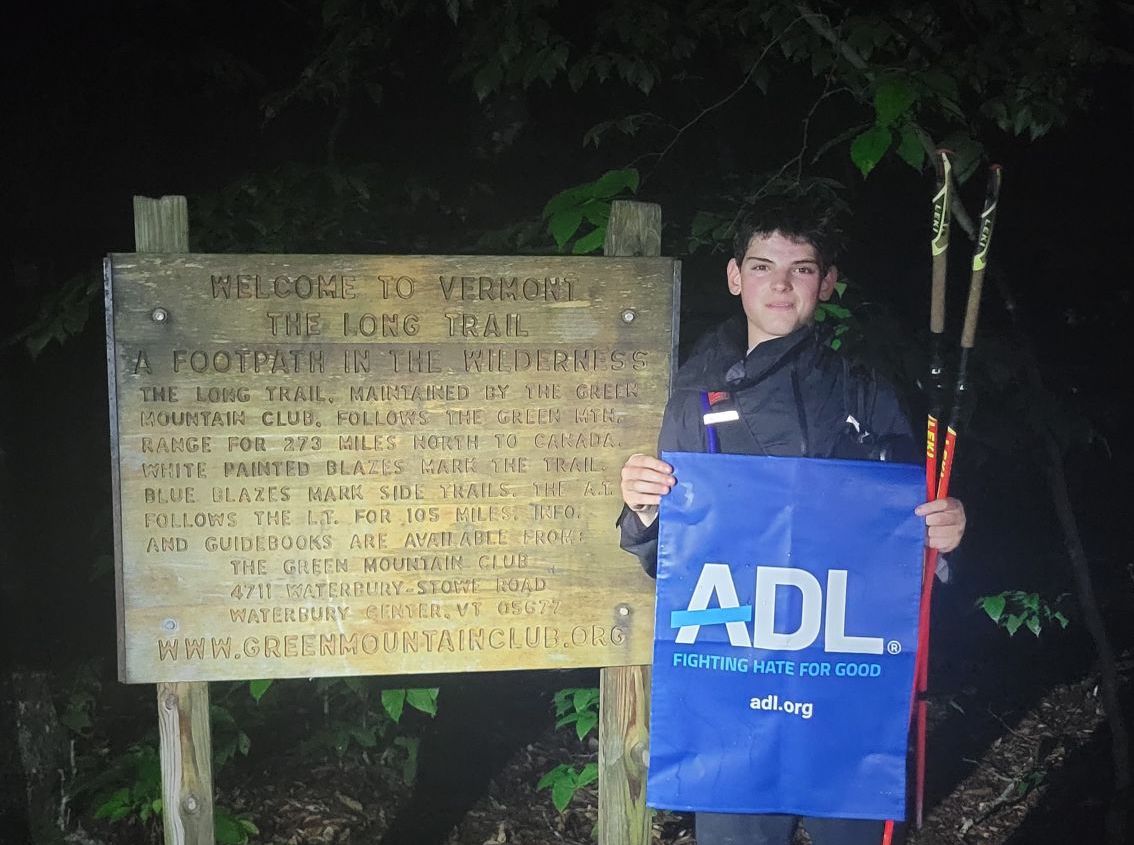By Rich Tenorio
It’s an understatement to say that Dan Osborn’s first two months with the Jewish Community Relations Council of Greater Boston have been unusually challenging.
This fall, Osborn, a Marshfield native who has most recently worked in the field of curriculum development, joined the JCRC in a newly created position—director of educational partnerships, created through a grant from Combined Jewish Philanthropies of Greater Boston. Although Osborn learned about the position this summer, his first day was Oct. 23—just over two weeks after the Oct. 7 Hamas terror attacks against Israel, in which about 1,200 people died and around 240 others were taken hostage. The attacks—and the resulting Israeli war against Hamas—have resulted in a complex situation for Osborn as he seeks to build relationships with stakeholders across Massachusetts school districts, the JCRC and other nonprofit organizations toward ensuring inclusive and accurate representation of Jewish history and identity and to help combat antisemitism in the K-12 educational spaces.
“One important takeaway,” Osborn said, “is there is a great amount of diversity throughout Massachusetts in how schools have responded to the crisis brought on by Oct. 7.”
“A considerable amount of pain and trauma surfaced by Oct. 7,” he said, “particularly in school districts that have a large amount of Jewish students and Israeli students. There have been concerns voiced about whether these schools are providing sufficient social and emotional services for students—and whether or not these districts are capable of providing trauma-informed services for students who need to go to school and have their needs tended to in K-12 settings.”
That’s where Osborn comes in. Part of his role is to connect school districts with relevant resources, whether it’s the JCRC or another nonprofit with a track record of combating antisemitism, such as the Anti-Defamation League or one of his previous employers, Facing History & Ourselves.
“We at the JCRC can be a trusted resource and ally for school districts,” he said. “We can be an intermediary and a facilitator between schools and those organizations.”
Meanwhile, Osborn works to develop connections within Jewish communities—including parents, students and rabbis—and relay their concerns to local school districts. At the same time, he cultivates ties with officials in these districts, including superintendents and principals.
In everything he does, he seeks an inclusive approach, from evaluating schoolwide communications following the Oct. 7 attacks to recommending guest speakers to come to schools and foster dialogue between different perspectives to encouraging a respectful atmosphere amid student activism.
“In recent weeks, there have been a lot of student-led walkouts and protests in schools,” Osborn said. “This has resulted in some students facing concerns over the politics of their classmates. This has resulted in some administrators unsure how to draw the line between free and protected speech, and also the need to protect the safety of Jewish students.”
Osborn’s position moves forward a key component of CJP’s 5-point plan against antisemitism—education strategy in the K-12 space in Greater Boston. Through the 5-point plan and CJP’s fighting antisemitism initiative, CJP is committed through this new position to deepening relationships and coordination with school administrators and leaders across the region in order to provide critically needed resources and tools on antisemitism, anti-Zionism and Holocaust education.
“It was an opportunity to work for, with and on behalf of the Jewish community in Greater Boston,” he said. “It was something that really speaks to my values, my convictions and professional aspirations, an opportunity that tied many of the disparate aspects of my academic and career path to date and wove them together in a role that has purpose and meaning.”
Osborn, 37, lives on the South Shore with his wife and infant son. He identified with his Jewishness early on in life. He describes the subject of Jews and Judaism as underrepresented in his history classes, something he eventually decided to tackle in professional life.
“As somebody who grew up in a Jewish home in a predominantly non-Jewish community, I felt like there were very few opportunities to see myself validated in the curriculum, and for my classmates and counterparts to encounter Jewish history in a way that was accurate, nuanced and humanizing,” he said. “I channeled those observations into a desire to study history, to teach history, and decided I wanted to have a more macro-level experience in education.”
Osborn was raised in an interfaith family, which he said gave him an added perspective on the diversity of the Jewish community.
“I believe it really shaped my deep commitment to working for interfaith and intercommunal dialogue,” he said, “and for being willing to cross cultural boundaries … My parents demonstrated to me on a daily basis their love and commitment to each other, despite their differences. That made me aware of the need to bring diverse people together.”
After receiving bachelor’s and master’s degrees at Quinnipiac University in Connecticut—in history and secondary education, respectively—he stayed in the Nutmeg State to work as a high school history teacher in Hamden. His subsequent stops include volunteering for the Peace Corps in a village in Jordan; getting a master’s degree in Near Eastern and Judaic studies at Brandeis University and a doctor of education degree at Boston University; and working for Facing History & Ourselves and then for the curriculum-development nonprofit Primary Source, his previous stop before joining JCRC.
“To shape the atmosphere and culture in schools so all students are able to leave K-12 education to thrive in a pluralistic, democratic society—it’s always what I wanted to do,” Osborn said. “I’ve always been informed by this goal and channel my Jewish values and sense of justice, healing and compassion into the work I do.”
Rich Tenorio covers antisemitism news for JewishBoston.com. His work has appeared in international, national, regional and local media outlets. He is a graduate of Harvard College and the Columbia University Graduate School of Journalism. He is also a cartoonist. Email him at richt@cjp.org.





